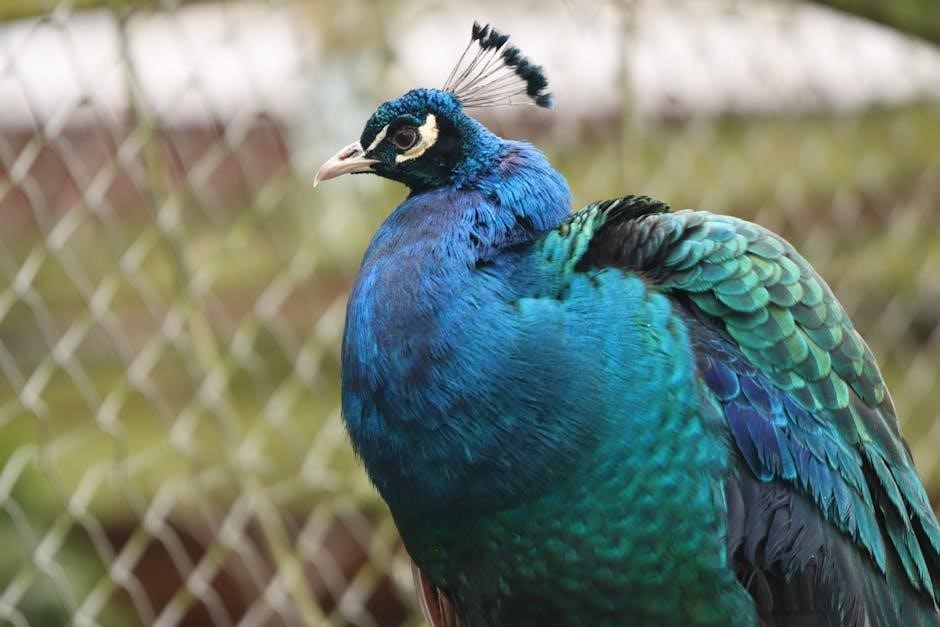
The AP Biology Syllabus 2024 offers a rigorous, college-level introduction to biology, focusing on the four big ideas, hands-on labs, and scientific practices. It prepares students for the AP exam while developing critical thinking, curiosity, and scientific literacy essential for STEM careers and further education.
1.1 Overview of the Course
The AP Biology course is a rigorous, college-level program designed to provide students with a deep understanding of biological concepts and principles. It is structured as a two-semester introductory biology course for biology majors, emphasizing the four big ideas: evolution, cellular processes, genetics, and ecological interactions. The curriculum integrates hands-on laboratory investigations, scientific practices, and critical thinking skills to prepare students for the AP exam and future STEM careers. It fosters curiosity, scientific literacy, and a foundation for advanced studies in life sciences.
1.2 Importance of the Syllabus
The syllabus serves as a roadmap for the AP Biology course, ensuring alignment with College Board standards and preparing students for the AP exam. It outlines the curriculum, learning objectives, and assessment methods, providing clarity and structure for both students and educators. By adhering to the syllabus, students can effectively navigate the course, understand expectations, and develop the skills needed for success in college-level biology and beyond. It ensures a comprehensive understanding of key biological concepts and practices.
1.3 Course Objectives
The AP Biology course objectives are designed to provide students with a deep understanding of biological concepts, aligning with the College Board framework. The syllabus focuses on the four big ideas, emphasizing enduring understandings and science practices. Students will develop skills in scientific inquiry, critical thinking, and problem-solving. The course aims to prepare students for the AP Biology exam while fostering a strong foundation for future STEM studies and careers, ensuring they are well-equipped to succeed in college-level biology and beyond.

Course Structure and Framework
The AP Biology course is structured around the four big ideas, integrating essential biological concepts, science practices, and inquiry-based learning, aligned with the College Board framework.
2.1 Four Big Ideas in AP Biology
The AP Biology course revolves around four foundational Big Ideas: evolution, cellular processes, genetics, and biological systems. These ideas provide a framework for understanding key biological concepts and their interconnections. Evolution explains the diversity of life, while cellular processes address the functioning of living organisms. Genetics focuses on heredity and information transfer, and biological systems explore interactions within and between organisms. These ideas guide students in developing a deep understanding of biology, aligning with the College Board’s emphasis on enduring understandings and scientific inquiry.
2.2 Course Units and Topics
The AP Biology course is organized into four primary units: Chemistry of Life, Cellular Processes, Genetics and Information Transfer, and Evolution and Ecology. Each unit builds on the previous one, providing a comprehensive understanding of biological principles. Topics include biochemistry, cell structures, metabolic pathways, genetics, evolutionary mechanisms, and ecological interactions. The curriculum is designed to integrate scientific practices and real-world applications, fostering a deep understanding of biology’s core concepts and their interconnectedness.
2.3 Integration of Science Practices
The AP Biology syllabus emphasizes the integration of six science practices: asking questions, analyzing data, developing explanations, evaluating evidence, proposing solutions, and communicating results. These practices are embedded in lab investigations, discussions, and problem-solving activities. By fostering these skills, students develop a deep understanding of scientific inquiry and its application to real-world problems, preparing them for success on the AP exam and in future STEM fields. This approach encourages critical thinking and scientific literacy.

Detailed Syllabus Breakdown
The syllabus provides a comprehensive overview of the course structure, including units on chemistry of life, cellular processes, genetics, and evolution. It outlines the four big ideas, ensuring a deep understanding of biological concepts and their practical applications through hands-on labs and real-world examples.
3.1 Unit 1: Chemistry of Life
Unit 1 explores the foundational chemistry of life, focusing on essential molecules like water, carbon, and biological macromolecules; Students investigate chemical bonds, pH, and enzyme function, linking these concepts to biological systems. The unit emphasizes the role of molecules in cellular processes and their significance in maintaining life, providing a solid base for understanding complex biological interactions and systems.
3.2 Unit 2: Cellular Processes
Unit 2 delves into the dynamic processes within cells, including transport mechanisms, photosynthesis, cellular respiration, and signal transduction. Students explore how cells maintain homeostasis, generate energy, and communicate. Key concepts like the structure and function of membranes, mitosis, and meiosis are emphasized. Through inquiry-based labs, students investigate cellular dynamics, fostering a deep understanding of how cells sustain life and respond to their environment, preparing them for advanced topics in biology.
3.3 Unit 3: Genetics and Information Transfer
Unit 3 explores the principles of genetics and how biological information is transferred. Students study DNA structure, replication, and gene expression, as well as Mendelian and modern genetics. Topics include inheritance patterns, genetic variation, and gene regulation. The unit emphasizes the role of genetic processes in evolution and diversity, aligning with the four big ideas in AP Biology. Hands-on labs and case studies help students apply theoretical concepts to real-world scenarios, reinforcing their understanding of heredity and molecular biology.
3.4 Unit 4: Evolution and Ecology
Unit 4 delves into the principles of evolution and ecology, exploring how populations change over time and interact with their environments. Topics include natural selection, speciation, phylogeny, and ecosystems; Students analyze biodiversity, population dynamics, and energy flow in ecosystems. The unit emphasizes evolutionary mechanisms and ecological interactions, connecting to the big ideas of biology. Through case studies and labs, students apply concepts to understand the complexity of life on Earth and human impacts on ecological systems.

Investigative Labs and Science Practices
The course emphasizes inquiry-based lab investigations, fostering scientific literacy through hands-on experiences. Students engage in experiments, data analysis, and argumentation, aligning with the six science practices.
4.1 Inquiry-Based Laboratory Work
Inquiry-based lab work is central to AP Biology, fostering critical thinking and scientific skills. Students conduct hands-on investigations, exploring biological concepts through experimentation and data analysis. These labs align with the College Board’s framework, emphasizing open-ended questions and collaborative learning. By designing experiments and interpreting results, students develop problem-solving abilities and scientific literacy. This approach prepares them for real-world scientific challenges and the AP exam, while deepening their understanding of biological principles and practices.
4.2 Science Practices in AP Biology
Science Practices in AP Biology emphasize the development of critical thinking and scientific literacy. Students engage in explaining biological concepts, analyzing visual data, and forming scientific questions. They learn to represent and describe data, as well as evaluate scientific evidence. These practices, aligned with the College Board’s framework, prepare students for the AP exam and foster skills essential for STEM fields. By integrating these practices, students become proficient in scientific inquiry and problem-solving, mirroring real-world biological research.

Assessment and Evaluation
The AP Biology course includes a mix of multiple-choice and free-response questions. Scoring guidelines and rubrics ensure consistency, while progress checks and practice exams prepare students effectively.
5.1 AP Biology Exam Format
The AP Biology exam consists of two sections: multiple-choice questions and free-response questions. Section I includes 60 multiple-choice questions, while Section II contains 6 free-response questions. Each section is timed, with 90 minutes allocated for multiple-choice and 90 minutes for free-response. The exam assesses understanding of the four big ideas, science practices, and course content. Students are provided with a reference sheet for equations and formulas during the exam.
5.2 Scoring Guidelines and Rubrics
The AP Biology exam is scored on a 1-5 scale, with 5 being the highest. Free-response questions are graded using detailed rubrics emphasizing conceptual understanding and scientific reasoning. Multiple-choice questions are scored based on correct answers. The total score combines both sections, with scaling to ensure fairness. Scoring guidelines and sample rubrics are released by the College Board to help students and teachers understand expectations and improve performance. These resources are available online for reference.
5.3 Progress Checks and Practice Exams
Progress checks and practice exams are essential tools for assessing student understanding throughout the AP Biology course. These resources, often provided through the College Board, help students identify strengths and areas for improvement. Practice exams mirror the actual AP Biology exam format, allowing students to familiarize themselves with question types and time management. Online platforms like AP Classroom offer digital progress checks, enabling teachers to track student progress and tailor instruction effectively. Regular practice enhances exam readiness and confidence.

Resources and Study Materials
Official College Board resources, including textbooks and online platforms, provide comprehensive study materials. Guides and manuals, like the inquiry-based lab manual, support student preparation and understanding.
6.1 Official College Board Resources
The College Board provides essential resources for AP Biology, including the Course and Exam Description (CED), which outlines the curriculum framework, exam format, and scoring guidelines. Official study materials like the Investigative Labs manual and past exam papers with scoring guidelines are available. Students can access free-response questions, sample responses, and progress checks through the College Board website. These resources ensure alignment with course objectives and prepare students effectively for the AP exam.
6.2 Recommended Textbooks and Guides
Key textbooks like AP Biology Investigative Labs and Campbell & Reese Biology are highly recommended for in-depth understanding. Supplementary guides, such as AP Biology Crash Course and 5 Steps to a 5: AP Biology, provide focused exam preparation. These resources align with the College Board syllabus, offering detailed explanations, practice questions, and study strategies. They complement online materials, ensuring students master both content and exam techniques effectively.
6.3 Online Platforms for Practice
Recommended online platforms include College Board’s AP Classroom, offering progress checks and video tutorials, and Khan Academy, providing interactive exercises. Additional resources like Albert.io and Quizlet offer practice questions and flashcards. These platforms align with the syllabus, helping students master concepts and exam techniques. Regular use enhances problem-solving skills and exam readiness, ensuring comprehensive preparation for the AP Biology exam.
Career and College Opportunities
AP Biology prepares students for college credit, advanced placement, and STEM careers. It fosters critical thinking, scientific inquiry, and skills valued in biology, medicine, and environmental fields.
7.1 College Credit and Placement
Earning a qualifying score on the AP Biology exam can grant students college credit or advanced placement. This allows them to bypass introductory courses, saving time and tuition. Many colleges recognize AP credits, giving students flexibility in their academic paths. The syllabus is aligned with college-level standards, ensuring preparedness for higher education. By excelling in AP Biology, students demonstrate readiness for rigorous coursework, enhancing their college applications and academic opportunities.
7.2 STEM Career Paths
AP Biology equips students with foundational knowledge and skills vital for STEM careers. The course emphasizes critical thinking, problem-solving, and laboratory expertise, preparing students for fields like medicine, research, environmental science, and biotechnology. By mastering biological concepts, students gain a competitive edge in pursuing careers as biologists, ecologists, medical professionals, or science researchers. The syllabus aligns with real-world applications, fostering a deeper understanding of scientific inquiry and its practical implications in STEM industries.
7.3 Skills Developed in AP Biology
AP Biology fosters critical thinking, problem-solving, and scientific inquiry skills. Students develop expertise in data analysis, laboratory techniques, and scientific communication. The course emphasizes collaboration, curiosity, and scientific literacy, preparing students for real-world applications. By engaging with complex biological concepts, students enhance their ability to connect ideas across scales, from molecules to ecosystems, while cultivating skills essential for STEM fields and lifelong learning.
The AP Biology syllabus 2024 provides a comprehensive framework for mastering college-level biology, emphasizing critical thinking, scientific practices, and real-world applications. It equips students with essential skills for STEM careers and lifelong learning, fostering a deep understanding of biological concepts and their interconnectedness.
8.1 Summary of Key Points
The AP Biology Syllabus 2024 emphasizes the four big ideas, hands-on labs, and science practices, aligning with College Board standards. It prepares students for the AP exam, fostering skills like scientific inquiry, critical thinking, and data analysis. The curriculum covers essential topics such as chemistry of life, cellular processes, genetics, and ecology. By mastering these concepts, students gain a solid foundation for STEM careers and college-level biology courses, ensuring they are well-equipped for future academic and professional challenges.

8.2 Final Tips for Success
- Engage actively in inquiry-based labs to deepen conceptual understanding and scientific skills.
- Regularly review and practice with past exams to familiarize yourself with the AP exam format.
- Stay organized, prioritize challenging topics, and allocate time for consistent study habits.
- Utilize College Board resources, such as the Course and Exam Description, for guided preparation.
- Seek clarification on complex concepts early to build a strong foundation.
- Develop a growth mindset, embracing challenges as opportunities to learn and grow.